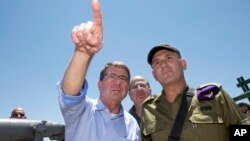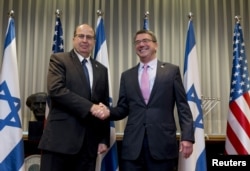U.S. defense chief Ash Carter said Monday that Israel is "the bedrock of American strategy" in the Mideast, opening a trip to the region aimed at strengthening U.S. links with allies that are wary of the new internationally negotiated Iranian nuclear accord.
Carter was warmly welcomed by his counterpart, Moshe Yaalon, and is set to meet Tuesday with Israeli Prime Minister Benjamin Netanyahu, who has called the pact blocking Tehran from building a nuclear weapon a "historic mistake."
On his arrival, Carter sought to assure Israel of staunch U.S. support.
"Israel is the bedrock of American strategy in the Middle East," Carter said. "Yes, the region is complicated and troubled, but we know what our interests are, and a principle among them for the United States is our friendship and alliance with Israel."
Yaalon thanked Carter for the U.S. contributions to Israeli security in the troubled Mideast.
On his flight to Israel, Carter said he had no expectation of trying to convince Israeli leaders to change their adamant opposition to the Iran pact agreed to by Britain, France, Germany, Russia, China and the United States. The deal imposes international monitoring on Tehran's nuclear program, but Israel contends that it will eventually allow Iran to build a nuclear weapon, endangering its security.
Iran's Zarif voices reservations
Iran Foreign Minister Mohammad Javad Zarif criticized both Israel and the U.S. Monday for not eliminating the possibility of military action against Iran in the wake of the nuclear agreement.
"Applying force ... is not an option but an unwise and dangerous temptation,'' Zarif said. Yet, he added, "There are people who talk about illegal and illegitimate application of force'' for their own purposes.
Zarif said last week's nuclear agreement, reached after months of negotiations, was a "victory of diplomacy over war and violence.''
Carter said the U.S. believes "the nuclear deal promotes the security in the region, the American strategy, and also the defense of Israel. But as I said, friends can disagree."
He further said the agreement places "important limitations" on Iran while not limiting what the U.S. or its allies can do to carry out their strategy in the region.
Next stop, Saudi Arabia
After Israel, the secretary will go to Saudi Arabia, Iran's main rival in the Middle East, for talks with King Salman and defense chief Mohammad bin Salman. Carter said those meetings will also focus on checking what he called "Iranian aggression" and influence as well as violent extremism carried out by the Islamic State group and other militants.
Carter is scheduled to travel to Jordan later this week.
The U.S. sends $3 billion in annual military aid to Israel, which signaled Friday it could eventually ask for more. Despite Israel's opposition to Iran's accord with the United States and five other world powers, Yaalon suggested that U.S. congressional approval of the Iranian pact is a foregone conclusion and that Israel's "situation here has changed and must be studied."
"We will ultimately, of course, have to go and talk about the trade-offs that Israel has coming to it in order to preserve a qualitative [military] edge," Yaalon said.






